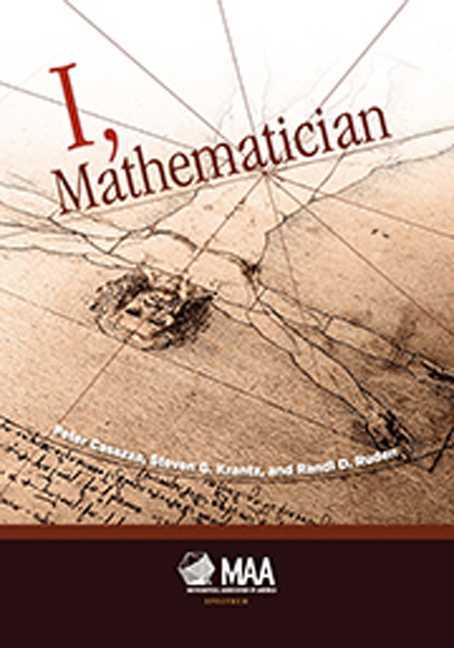Book contents
- Frontmatter
- Contents
- Preface
- Part 1 Who Are Mathematicians?
- Foreword to Who Are Mathematicians?
- 1 Mathematicians and Mathematics
- 2 What Are Mathematicians Really Like? Observations of a Spouse
- 3 Mathematics: Art and Science
- 4 A Mathematician's Survival Guide
- 5 We Are Different
- 6 The Naked Lecturer
- 7 Through a Glass Darkly
- 8 What's a Nice Guy Like Me Doing in a Place Like This?
- 9 A Mathematician's Eye View
- 10 I am a Mathematician
- Part II On Becoming a Mathematician
- Part III Why I Became a Mathematician
Foreword to Who Are Mathematicians?
from Part 1 - Who Are Mathematicians?
- Frontmatter
- Contents
- Preface
- Part 1 Who Are Mathematicians?
- Foreword to Who Are Mathematicians?
- 1 Mathematicians and Mathematics
- 2 What Are Mathematicians Really Like? Observations of a Spouse
- 3 Mathematics: Art and Science
- 4 A Mathematician's Survival Guide
- 5 We Are Different
- 6 The Naked Lecturer
- 7 Through a Glass Darkly
- 8 What's a Nice Guy Like Me Doing in a Place Like This?
- 9 A Mathematician's Eye View
- 10 I am a Mathematician
- Part II On Becoming a Mathematician
- Part III Why I Became a Mathematician
Summary
Certainly one of the main focuses of our special session at the MAA Math Fest in 2007 was the question of who mathematicians are and how we think of ourselves. Also we talked about how others (non-mathematicians) think of us. This part of the book is squarely situated in that circle of ideas.
There is no question that many of us think of ourselves in terms of the mathematical work that we do—proving theorems, writing papers, writing monographs, authoring texts, giving talks. But we also think of ourselves as communicators and teachers. Certainly there is no meaning, and little value, to our mathematics if we do not effectively communicate it and teach it to others. And, thanks to Euclid of Alexandria, we have a well-developed paradigm for doing so. For two thousand years we have had logic and the axiomatic method and Occam's razor as the model for mathematical development. And it has served us well.
This mode of thought shapes not only the way that we write but also the way that we teach. For our job as mathematics teachers is to show our students how mathematical discourse works, and why it works. We want to teach them many particular ideas and techniques, but we also want to teach them the critical thinking skills that shape our lives.
The essays in this part of the book reflect the value system described in the preceding paragraphs. Several accomplished mathematicians, from many different fields and disciplines, describe their personal take on who mathematicians are and what they are trying to accomplish. Many of these essays are quite personal, and they all serve as role models for young people studying mathematics today—budding math teachers, math communicators, and math researchers.
This part of the book should be assessed and digested alongside the “On Becoming a Mathematician” part of the book; the two taken together form a whole that is greater than the sum of its parts.
Information
- Type
- Chapter
- Information
- I, Mathematician , pp. 3 - 4Publisher: Mathematical Association of AmericaPrint publication year: 2015
